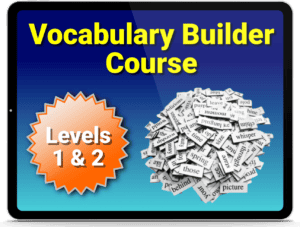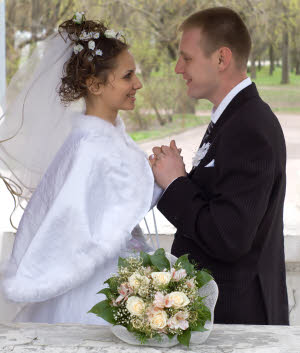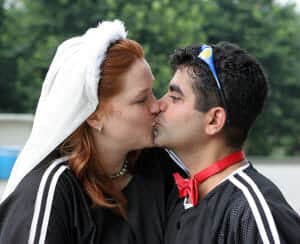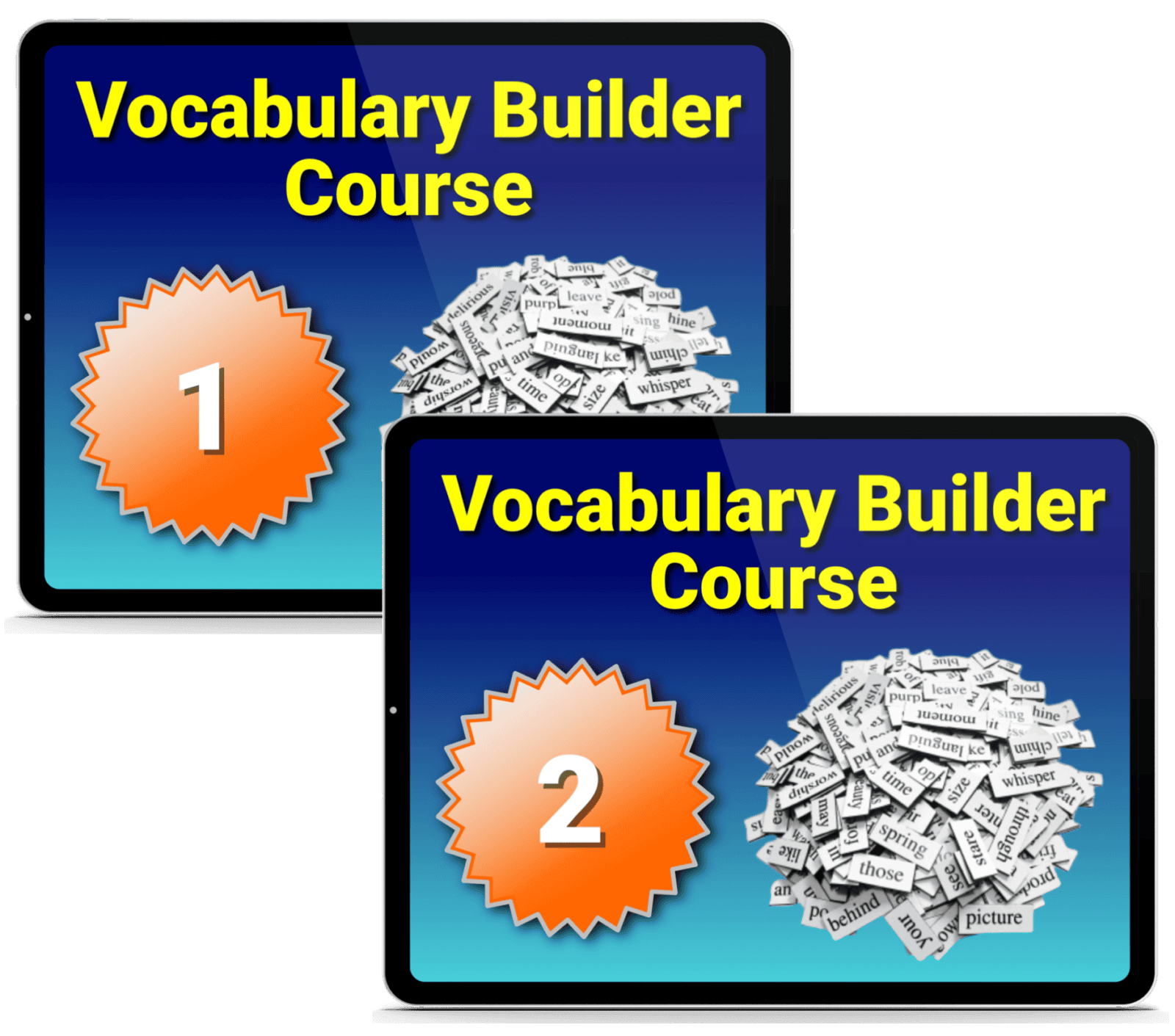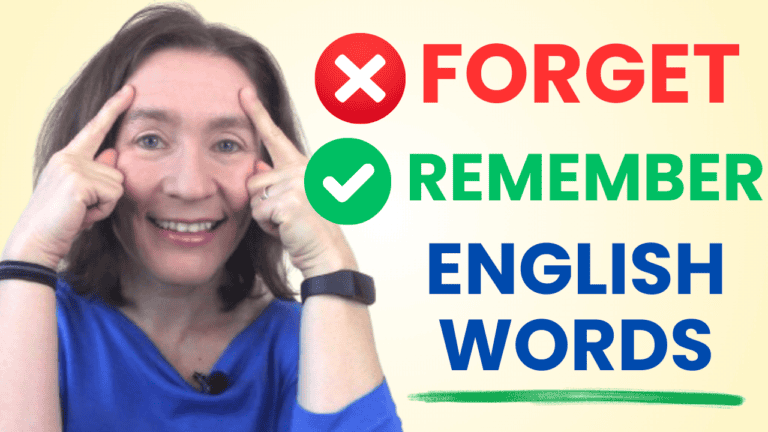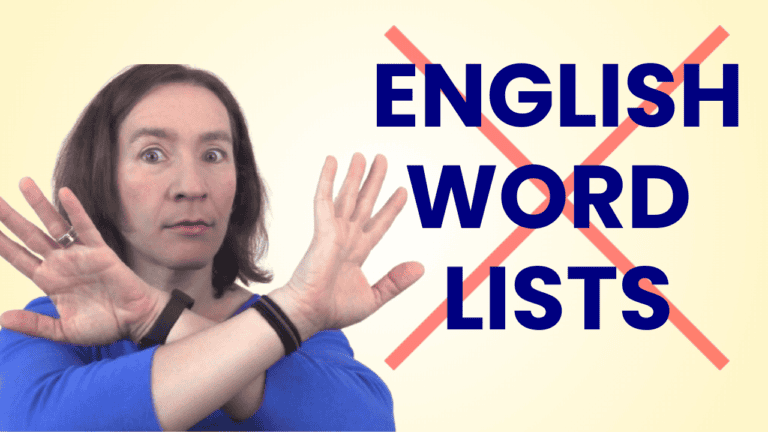
I’ve divided today’s vocabulary into three groups – starting a romantic relationship, being in a relationship, and ending a relationship.
When you want to expand your vocabulary, it’s very effective to learn groups of words like we’re doing today. This keeps the vocabulary more organized in your mind, and then it’s much easier to talk about the topic.
You can continue learning this way inside my Vocabulary Builder Courses, which will teach you hundreds of common and extremely useful English words!
Beginning a relationship
Have a crush on someone
To “have a crush on someone” means you feel romantically attracted to that person. Often people keep their “crushes” a secret because they are afraid that the feelings aren’t mutual (that the other person doesn’t have the same feelings).
Example: I have a crush on a girl in my English class. She’s beautiful, smart, and funny – but I’m too shy to talk to her!
Flirt with someone
When you “flirt with someone,” you do things and say things that show you are interested in that person romantically. Another informal phrase is “hit on someone” – it doesn’t mean to hit the person violently; it means to flirt!
Example: Did you see the guy who was flirting with Jenny? He bought her a drink, talked to her all night, and asked for her phone number.
Ask someone out
When you “ask someone out,” you invite them to do something with you in a romantic context – for example, seeing a movie or having dinner in a restaurant.
Example: Peter finally asked me out! We’re going to the theater together on Friday night.
Fall in love
When you “fall in love,” you start having romantic feelings about another person.
Example: I think I’m falling in love with Melissa. I can’t stop thinking about her!
Love at first sight
Some people believe in “love at first sight” – when you fall in love with a person in the first moment you see or meet him or her.
Example: I knew Mary would become my wife from the moment I first saw her at the party. It was love at first sight!
In a relationship
Date
“Date” is both a noun and a verb.
As a noun, it means a romantic activity that two people do together.
Example: My date with Peter last Friday was wonderful. I really enjoyed his company at the theater.
As a verb, it means “in a relationship with”
Example: I heard that your brother is dating a model. Is it true?
Going out with
“Going out with” is another informal way to say “in a relationship”
Example: Did you know that Mark is going out with Andrea?
Stand someone up
When you “stand someone up,” you agree to go on a date with the person, but then you don’t go (and you don’t call or give any explanation). It’s considered rude to do this.
Example: I was planning to have dinner with Barbara, but she stood me up. I waited for her at the restaurant for three hours, but she never came.
Hug
When you “hug” someone, you put your arms around them:
Kiss
You use your lips to “kiss” someone:
Propose
When you propose to someone, you ask the person to marry you. In English, most people propose with the words, “Will you marry me?”
Example: John proposed to Sarah on the beach at sunset.
Engaged
When a person is “engaged,” it means they have agreed to marry someone.
Example: Did you hear? John and Sarah are engaged! They’re planning a June wedding.
It’s common for women who are engaged to wear an engagement ring:
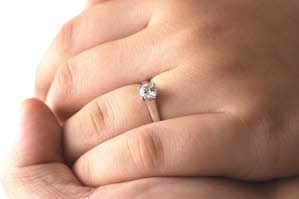
Fiancé / Fiancée
A man who is engaged is called a fiancé, and a woman is called a fiancée.
Example: My fiancée has already sent out the wedding invitations.
Note: Fiancé and fiancée are always used with a possessive such as “my” “his” and “her.” So we don’t say “She’s a fiancée.” We say “She’s engaged.”
Get married
When two people make the commitment to stay together as husband and wife.
Example: We got married in 1972, so we’ve been together for more than 30 years!
Note: On the day of the wedding ceremony, the woman is called the bride and the man is called the groom
Honeymoon
When a recently-married husband and wife travel or take some vacation time to be together.
Example: They went to Costa Rica for their honeymoon.
Anniversary
The date on which the husband and wife got married. Many couples celebrate this date every year by going out to dinner or exchanging gifts or flowers.
Example: My parents’ wedding anniversary is May 22nd.
Note: Anniversary is different from “birthday.” Birthday is the celebration of the day you were born; anniversary is the celebration of the day you were married.
Ending a relationship
Break up / Split up
These words mean “end a relationship” – it can be a boyfriend/girlfriend relationship or a husband/wife relationship.
Example 1: Jerry and Amanda split up because he wanted to have children and she didn’t.
Example 2: I think I’m going to break up with my boyfriend. We just don’t have much in common.
Separated
To be “separated” means that a husband and wife are not living together, but are not officially divorced.
Example: I heard that Sandra and her husband are separated at the moment. I hope they can work out their problems.
Divorce
To “divorce” means that a man and woman formally and legally end their marriage.
Example: “I divorced my husband after he became an alcoholic.”
Ex-
Add ex- to describe people you had relationships with in the past: ex-husband, ex-wife, ex-girlfriend, ex-boyfriend.
Example: I’m not friends with my ex-boyfriend because our relationship ended pretty badly.
Note: Some people say only “ex” without saying husband, wife, etc. For example, “My ex won’t stop calling me! I wish she would stop!”
Learn more: 100 synonyms to expand your vocabulary


